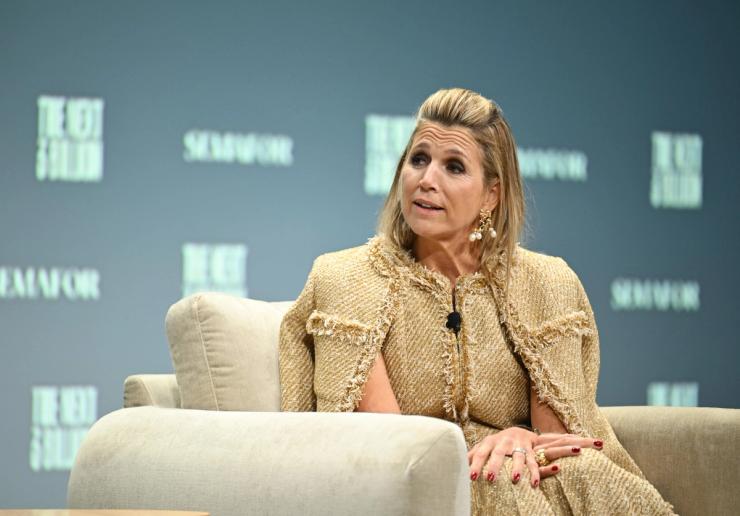The News
Queen Máxima of the Netherlands was on stage at Semafor’s The Next 3 Billion Summit last Wednesday, telling me about her role as the United Nations Secretary General’s special advocate for financial health, when a couple of things occurred to me.
First, I probably wouldn’t be interviewing any other UN technocrat on a big stage about the same subject. And relatedly, perhaps a missing ingredient from our failing modern institutions is royalty.
So I derailed our conversation to bounce that theory off Her Majesty: Would struggling, faceless 20th-century institutions like the UN be better loved if they had royal families of their own?
The queen greeted this insane question with a politely regal stare, ignored my faux pas, and continued talking about financial inclusion.
But when I got back to the office, I messaged the chattiest of contemporary royals, Eduard Habsburg, the hereditary Archduke (his great-great-great-grandfather was Emperor Franz Joseph I, uncle of the less fortunate Archduke Ferdinand) who currently serves as Hungarian ambassador to the Holy See. Habsburg is the author of The Habsburg Way: 7 Rules for Turbulent Times. The book features an introduction from Hungarian Prime Minister Viktor Orbán, and advice including “Die Well (and Have a Memorable Funeral).”
“I think we human beings are more easily attracted by a family or by faces or by people than by faceless institutions,” he said, when I asked whether the EU would be better loved if it adopted one of the semi-employed Habsburgs. But, he added, “you can’t wish a monarchy back into reality that isn’t there any more.”
If that question is academic, Habsburg’s next observation wasn’t. It was about Donald and Melania Trump.
“They have something of a royal family — him and his wife and Barron and all that,” he said. “I believe that he is someone who is very strong on respecting the normal people on the road — the people working on the gardens. That’s a very royal virtue.”
In this article:
Know More
We live, unexpectedly, in an age of royalty. America’s most steadfast allies in this bit of the 21st century are the Gulf monarchies, true and unapologetic kingdoms big on pomp and light on participation. The only leverage one of America’s old friends seems to have found with the current president is the allure of meeting King Charles.
Charles’ engagement with Trump during this month’s state visit may have been as valuable as anything Prime Minister Keir Starmer — whose Labour is one of those classic, struggling institutions — has done to woo the US president.
“I think he represents the country so well,” Trump said of Charles before a ritualistic visit to Windsor Castle. “He’s such an elegant gentleman.”
Ben’s view
Habsburg’s observation about Trump rings true. Put aside the century-long consolidation of power in the White House, which Trump has accelerated but didn’t start. During his second term in particular, Trump has operated, more than any US president, through the public performance of his own office. As he goes, so does his party.
And he has a personal taste for parades and interior decorating that his opponents mock, but which matches this performative moment.
Those priorities were clear at the UN last week, where his newly demoted Ambassador Mike Waltz served his leader best by complaining about protocol — a broken escalator, a faulty teleprompter, a translation glitch. “The United States will not tolerate threats to our security or dignity,” he wrote.
And of course this all plays well in the primary forum for global politics, the fragmented digital media space. Digital social media is often described as “populist,” but it has always loved royals. I learned that when I was running BuzzFeed News and tried to turn our coverage in a small-r republican direction, only to be informed that our traffic depended in some part on our audience’s obsession with Harry, Meghan, William, Kate, et al.
King Charles, obviously, is a figurehead with virtually no procedural power. Perhaps that’s part of why he enjoys popularity virtually any elected official would envy: 40 percentage points more Britons view him favorably than unfavorably, according to YouGov. Encouragingly, a 48% plurality tell Ipsos the monarchy is “good value for money” — and that’s before he helped steer Britain through Trump’s tariffs.
That’s where the Trump parallels fall apart. Trump’s public approval numbers mirror every other unpopular, divisive Western leader’s. (The other North Americans are ahead of him; every major European leader save the low-profile Swiss president is behind him, per Statista’s aggregation of favorable rankings.)
Trump’s performative style and his embrace of old-fashioned pageantry have helped him hold on to an immovable political base in a divided moment; but the striking thing about the European royals who endure is the care they take to be unifying national figures.
Trump can unify his side of the nation’s current civil conflict better than any Democrat unifies theirs. But his failure to broaden his base — indeed, his disinterest in bridging both sides of a polarized nation — is where modern royal comparisons end.
Room for Disagreement
The Dial did not like Habsburg’s cheerful tract, or the royal point of view: “The Habsburg Way supposes we could all have six children if only we had the right values — as if large families did not require myriad forms of material support, as if political economy were irrelevant. He turns social questions into matters of conscience and will.”
Notable
- “However much the UK’s global clout has waned, it is still true that nobody does pageantry like the British,” wrote the FT editorial board. “Donald Trump likes to talk about people having the cards, and the US president no doubt has aces to play in terms of military and economic power. Britain, though, has real kings and queens. And, as this week showed, it knows how to use them.
- More than his name, Habsburg credits his niceness with his success as a diplomat: “I can get along with anybody,” he told The New York Times in 2023.
- The American monarchist movement is less pageantry and more “liquidation of democracy,” according to one of its most famous proponents.


